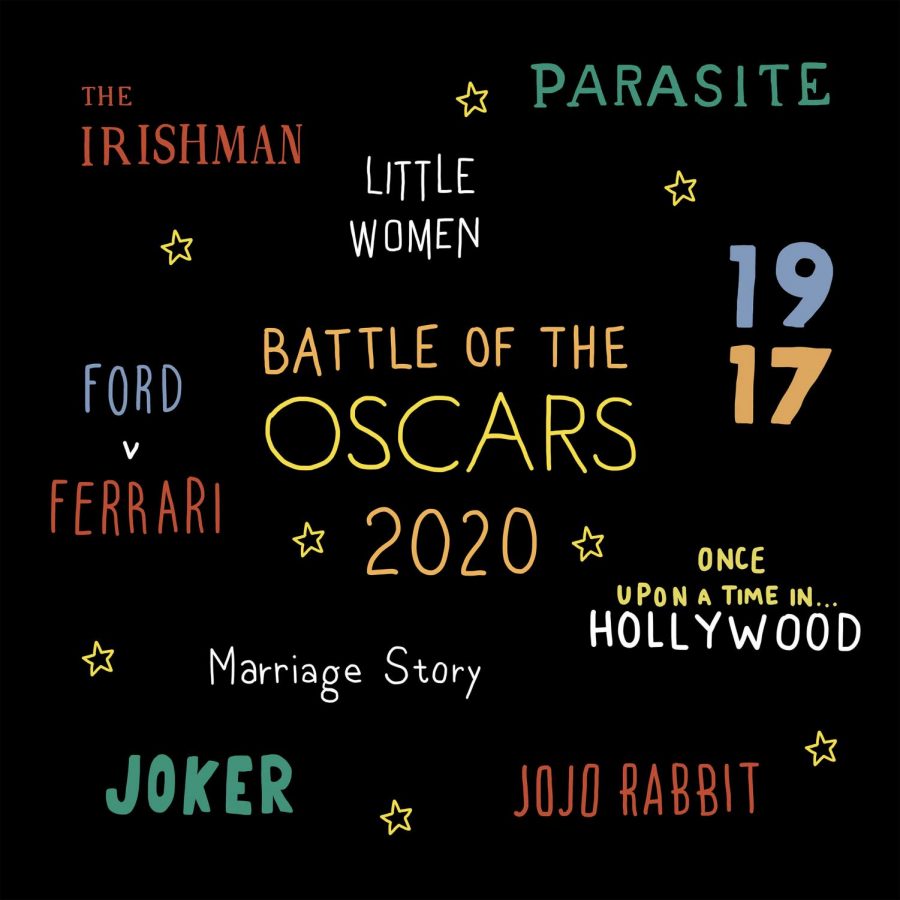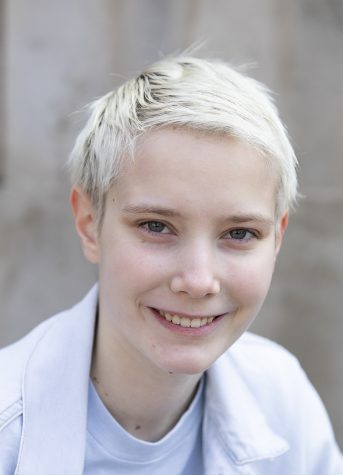Battle of the Oscars II
February 10, 2020
This year, the Academy once again tried something new by awarding one of the best films of the year the prize of Best Picture. While that may seem obvious, previous winners like “Green Book” and “Shakespeare in Love” show that the Academy isn’t always great at determining which Pictures really are the Best. Bong Joon Ho’s “Parasite” won the top prize, becoming the first foreign language film to do so, as well as sweeping three more awards (Best Director, Best Original Screenplay, and Best International Film)
For the second year in a row, The Observer has pitted writers against each other to see who could correctly predict the most winners at this year’s Academy Awards. Although some of the writers were different, the winner stayed the same: Ethan Coughlin won with 16 correct predictions out of a total 24 awards. Did Coughlin use his contacts at PricewaterhouseCoopers to rig the results in his favor? Read on to find out.
By CLEO PAPADOPOULOS
Leading Actor / Supporting Actor — To no one’s surprise, Joaquin Phoenix took home the award for Actor in a Leading Role for his role as Arthur Fleck/the Joker in “Joker.” His portrayal of the Joker will most likely be remembered as one of the most deranged and thought-provoking depictions of the famed DC villain. In a similar vein, Brad Pitt won the award for Actor in a Supporting Role for his part of Cliff Booth in “Once Upon a Time … in Hollywood.” Pitt played the best friend and stunt double of Hollywood actor Rick Dalton, portrayed by Leonardo DiCaprio. Both Phoenix and Pitt also won in their respective categories at the Golden Globes, the SAG Awards, the Critics’ Choice Awards and the BAFTAs.
Leading Actress / Supporting Actress — The category of Leading Actress showed similar predictability. Renée Zellweger won for her role of Judy Garland in the biopic “Judy.” While Zellweger’s portrayal of Judy was compelling, I would’ve personally loved to see Saoirse Ronan win for her phenomenal work as Jo March in “Little Women.” After taking home the awards for Actress in a Supporting Role at the Golden Globes, the BAFTAs and the SAG Awards, Laura Dern received an Oscar for her role of Nora Fanshaw in “Marriage Story.” She portrayed a strong-willed, independent divorce lawyer who delivered one of the most memorable monologues in the film.
Costume Design — The award for achievement in Costume Design was awarded, to my delight, to “Little Women.” Jacqueline Durran worked as the costume designer for Greta Gerwig’s 2019 adaptation of Louis May Alcott’s 1868 novel. Durran’s work truly emulated the clothing of the time, ultimately bringing this period piece to fruition and making it completely unforgettable. “Little Women” has quickly become one of my all-time favorite films.
By POLINA UZORNIKOVA
Best Adapted Screenplay — I was delighted to see Taika Waititi to win this award, since Jojo Rabbit was definitely among the films most enjoyed by Fordham students this past fall. Jojo Rabbit takes on a familiar premise, persecution of Jews under Hitler, and spins it under a fresh angle, telling the story through the eyes of a boy who has Adolf himself for an imaginary friend. Hilarious and heartbreaking at the same time, Waititi’s adapted screenplay delivers a poignant message of tolerance. I was, however, a bit saddened by the fact that Little Women did not get this award, since Greta Gerwig was equally deserving of the award.
Best Original Screenplay — Although I personally thought that Marriage Story would win the award, I was nevertheless pleased with Bong Joon-ho and Han Jin-won receiving the award for their Parasite. Just like Jojo Rabbit, the screenplay delivers an acute social commentary, yet, its methods of dark humor and ultraviolence are quite different from Taika Waititi’s more subtle approach. The two films cannot be adequately compared, however, since they belong to two different categories, and are equally effective and captivating in their own niches. Seeing South Korean screenwriters get such a prestigious award was personally inspirational for me and for many other international students at Fordham.
By BEN JORDAN
Original Score / Original Song — Neither Hildur Guðnadóttir’s win for the “Joker” score nor Elton John and Bernie Taupin’s win for “(I’m Gonna) Love Me Again” came as a real surprise to anybody following the musical aspects of awards season hype. While Guðnadóttir’s taking of the prize is definitely remarkable given that she’s the first female winner since the award was merged from separate music/comedy and dramatic awards in 2000. While none of the scores were particularly groundbreaking — “1917” occasionally sounded like it was ripping off the music from a “Battlefield” game, John Williams produced the exact same “Star Wars” score he’s been producing for over 40 years and “Marriage Story” was fine — I was personally hoping Alexandre Desplat’s wonderfully twee “Little Women” score would win, if only to shut “Joker” out from winning any awards. My wish didn’t come true. John and Taupin’s win for their song from “Rocketman” was definitely appropriate, as the only other great song in the field was “Stand Up” from “Harriet.”
By ETHAN COUGHLIN
Best Cinematography — Attempting to make a two-hour movie look like one shot comes down to two things: cinematography and editing. One of the best cinematographers of all time, Roger Deakins was awarded Best Cinematography for his work on “1917.” While the film’s cinematography is certainly impressive and a technical feat in itself, I would have preferred to see the more creative work on “The Lighthouse”’ be rewarded at the ceremony. Ultimately, “1917” will fall into obscurity with all the other Oscar-bait war films, remembered only for the fact that its team tried to make the film look like a single shot.
Best Editing — While many expected “1917” to win Best Editing for its “invisible” cuts, it was Michael McCusker and Andrew Buckland who took home the award for “Ford v Ferrari.” Similarly to the cinematography category, the Academy decided to go with the safe pick in this category. The editing of “Parasite” was more effective and more creative than the work in “Ford v Ferrari,” and legendary editor Thelma Schoonmaker’s work on “The Irishman” was as impressive as her work with Martin Scorsese. This is the second year in a row where the winner of this category has been mediocre at best, after “Bohemian Rhapsody” won the prize last year.
Best Sound Editing and Mixing — Every Oscar night, Google searches for “sound editing” and “sound mixing” spike as casual viewers try to figure out the distinction between the two. In short, sound editors create all the sounds you hear in a scene. Sound mixers take the sounds from the sound editors and mix them into a way that sounds natural to the audience. Often, the same film wins both categories; however, “Ford v Ferrari” won Best Sound Editing while “1917” won Best Sound Mixing this year. Both wins were deserving in two categories where the Academy could not have gone wrong choosing any of the nominees.















